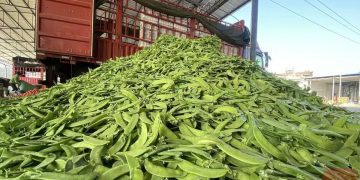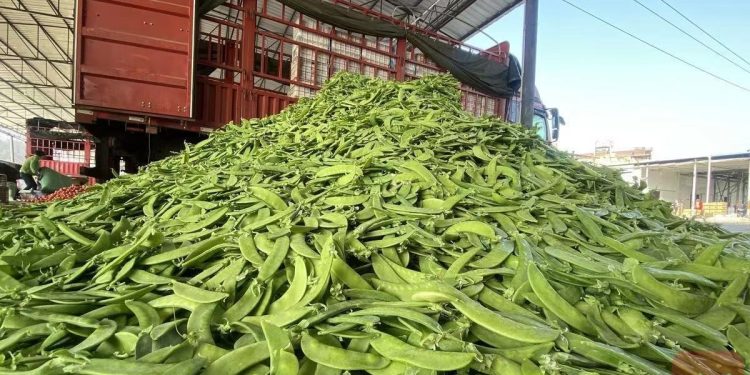Sichuan Online reporter Tang Ziqing Text/Picture
“It’s so early!””Load the car early and set off early!””Early in the morning of February 1st, in front of a tomato acquisition point in Binggu Town, Miyi County, Panzhihua City, Hu Hang, a salesman from Wandelong Trading Co., Ltd., Nanyang City, Henan Province, jumped out of the truck and prepared to complete the loading in the morning.
Entering February, Miyi’s early spring vegetables ushered in a large number of launches, and the sales season will continue until May.“This year’s early spring vegetables are mainly eggplant fruits, beans, and melons, with a planting area of 73,000 mu, an increase of 1,900 mu over last year.Supply and marketing are booming, and Miyi’s early spring vegetables have become a business card.”Chen Hua, the stationmaster of Miyi County Characteristic Industry Station, said.
Walking into the main early spring vegetable production area of Leiwo Village, Binggu Town, Miyi County, the greenhouses are neatly arranged. In a tomato growing greenhouse, the villager Xia Fengquan and his wife are busy picking tomatoes. “Our greenhouse adopts integrated water and fertilizer management and double membrane coverage. The quality of vegetables is better and the price is more stable.”Xia Fengquan said.
There are green vegetables all year round and fresh fruits every month.In recent years, the farmland infrastructure of the Miyi vegetable production area has been continuously improved, and the integrated management of water and fertilizer for vegetable cultivation has been fully covered. Organic fertilizers have replaced chemical fertilizers and biological pesticides have replaced chemical pesticides. Product quality and safety supervision have been strengthened, and vegetable production and quality have been further improved.
“The quality is stable and unstable, and the seedlings are very important.”In the Lvyi Fruit and Vegetable Science and Technology Demonstration Park in Miyi County, the reporter met Leng Tianhua, who was busy observing the breeding demonstration field. “In addition to breeding and testing new varieties, I also have a very important job every year-seedling breeding.””
According to Leng Tianhua, there are currently 115 acres of high—standard greenhouses in the demonstration park, of which more than 90 acres are undertaking the task of factory seedling breeding from May to November every year.Last year, more than 45 million vegetable seedlings of all kinds were cultivated here. The seedlings cultivated in the factory not only have a high survival rate, but also the seedlings are strong and neat, the vegetable growth cycle is short, and the vegetable yield is high, allowing vegetable farmers to “win” at the starting line.
Vegetables were busy going on the market, and Wu Tianju, director of the Agricultural and Rural Service Center of Binggu Town, was finally able to rest.
Engaged in agricultural technology services for more than 20 years, Wu Tianju has witnessed the development of Miyi’s early spring vegetables. “From hand-in-hand teaching to point-to-point help, there are more large farmers and more channels for everyone to solve technical problems.”In addition to solving problems face-to-face, Wu Tianju and colleagues also used the Sichuan Science and Technology Xingcun online platform to feedback the collected planting problems to agricultural experts for more professional help.
What makes Wu Tianju even more pleased is that as early spring vegetables are recognized by more markets, more and more planting orders are pouring in, and more orders for agricultural technology services have also opened new doors for the development of local characteristic agriculture.
Because of the signing of a tomato order with the Kangjian Huimin Cooperative in Xincun, Binggu Town, Miyi County, Beijing Xinzhenghe Agricultural Technology Co., Ltd. sent a team of 5 people into the village to provide technical services to local farmers from soil conditioning to planting management. “I’m afraid that the problem can’t be solved in time, the team members stationed during the Spring Festival and did not go home.”Yi Hong, the project leader of the company, said.
“In order to control the sweetness, size, and appearance of tomatoes, standardized planting must be used for management.Whether it is planting concept or plant protection technology, it is an innovation.”Yi Hong said that the tomatoes currently grown are mainly sold to the three provinces (cities) of Sichuan, Guizhou and Chongqing, and will be expanded to the South and East China markets in the future.
A source: https://sichuan.scol.com.cn































